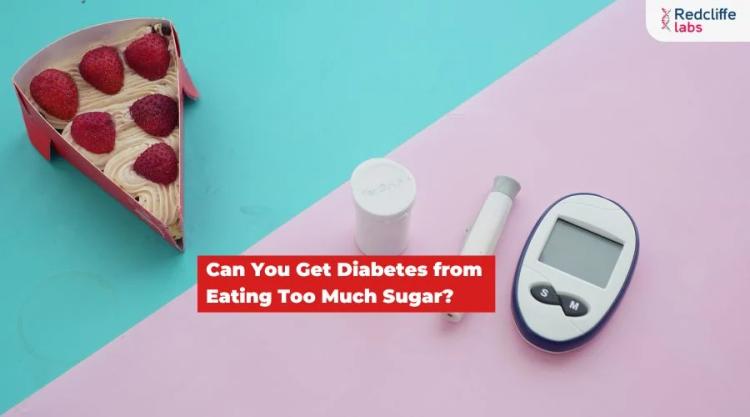Living with Diabetes: Symptoms, Types, Diagnosis, and Treatment Options Explained

Medically Reviewed By
Dr Divya Rohra
Written By Ritish Sharma
on Feb 8, 2023
Last Edit Made By Ritish Sharma
on Jan 23, 2025

Diabetes is a chronic health condition affecting millions of people worldwide, but it doesn't have to be daunting! With the right information, support, and timely diagnosis, effectively managing diabetes is possible.
The condition is caused by a problem with how the body processes glucose, leading to elevated levels in the bloodstream. This blog will look at the different types of diabetes, what diabetes symptoms to watch out for, how to get a proper diagnosis, and the various treatment options available.
We aim to provide you with a comprehensive understanding of diabetes and help you navigate this journey with confidence and ease. Whether you have been recently diagnosed or have been living with diabetes for some time, this guide will be invaluable.
Understanding Diabetes
Diabetes is a chronic health condition that occurs when the body cannot process glucose properly, which is a crucial energy source for the body. Glucose levels in the bloodstream become elevated, leading to various health problems.
Without proper management, diabetes can lead to severe complications such as heart disease, nerve damage, and blindness. It is essential to understand and manage diabetes to maintain good health.
There are two main two types of diabetes:
Type 1 Diabetes
Type 1 diabetes is a chronic health condition in which the body does not produce insulin, a hormone that regulates glucose levels in the bloodstream. It is usually diagnosed in childhood or adolescence and is sometimes referred to as juvenile diabetes.
It is estimated that up to 10% of people who have diabetes have Type 1. Type 1 diabetes is considered an autoimmune condition and is not preventable. People with Type 1 diabetes must regularly monitor their blood sugar levels and take insulin injections or use an insulin pump to regulate their glucose levels.
Type 2 Diabetes
Type 2 diabetes is characterized by high levels of glucose in the bloodstream. Unlike Type 1 diabetes, which is caused by a lack of insulin production, Type 2 diabetes is caused by the body's inability to use insulin effectively.
This type of diabetes is often linked to lifestyle factors such as being overweight, lacking physical activity, and having an unhealthy diet, although it can also be genetically inherited. Type 2 diabetes is the most common form of diabetes, affecting up to 95% of individuals with the condition. With proper management, people with Type 2 diabetes can lead healthy and active lives.
Gestational Diabetes
It is a type of diabetes that affects women during pregnancy. It occurs when the body cannot produce enough insulin to regulate the increased glucose levels during pregnancy. This type of diabetes can lead to high blood sugar levels, harming the mother and the developing fetus.
Gestational diabetes usually develops during the second or third trimester of pregnancy and goes away after the baby is born. Early detection and treatment of gestational diabetes can help prevent complications during pregnancy and delivery.
Who’s Most at Risk for Developing Diabetes?
Here are a few key factors that can increase your risk:
- Family history of diabetes
- Being overweight or obese
- Inactivity and sedentary lifestyle
- Poor diet high in sugar and unhealthy fats
- Age (the risk increases as you get older)
- High blood pressure
- Presence of autoantibodies
- Abnormal cholesterol levels
- Having polycystic ovary syndrome (PCOS)
- A history of gestational diabetes
Understanding that having one or more risk factors doesn't necessarily mean you will develop diabetes.
But, being aware of these risk factors and early diagnosis can help you take steps to reduce your risk and maintain good health.
Diabetes Diagnosis
Diagnosing diabetes involves several tests to measure glucose levels in the blood. Here are some common diagnostic tests:
Fasting Blood Sugar Test (FBS): This test measures glucose levels in the blood after an overnight fast, usually first thing in the morning. If your blood sugar level is 126 milligrams per deciliter (mg/dL) or higher after fasting, you may have diabetes.
HbA1c Test (also known as the A1c test): This test measures average blood sugar levels over the past two to three months by measuring the amount of glycated hemoglobin in your blood. HbA1c levels of 6.5% or higher are indicative of diabetes.
Oral Glucose Tolerance Test (OGTT): This test measures glucose levels in the blood after a fast and after drinking a sweet liquid. Your healthcare provider will measure your blood sugar levels at different intervals, usually one and two hours after drinking the liquid. If your blood sugar level is higher than normal at any point, you may have diabetes.
Random Blood Sugar Test (RBST): This test measures glucose levels at any given time, regardless of when you last ate. A random blood sugar level of 200 mg/dL or higher may indicate diabetes.
Continuous Glucose Monitoring (CGM): This test involves wearing a continuous glucose monitoring device that tracks glucose levels throughout the day and night. The device measures interstitial fluid glucose levels, which reflect blood sugar levels.
Comprehensive Diabetes Check: At Redcliffe Labs, we offer a comprehensive Diabetes Check that covers all the significant parameters to help monitor and manage the condition. This check includes tests for blood sugar fasting, HbA1c, lipid profile, liver function test (LFT), kidney function test (KFT), and urine routine and microscopic examination (R/M).
With this check, you can get a complete picture of your diabetes status and track any changes over time. The best part is that you can book this test in the comfort of your home with a free home sample collection, making it convenient and stress-free.
Diabetes Treatment
Diabetes is a chronic condition that requires careful management to prevent long-term complications. Here are some of the most common treatment options for diabetes:
Lifestyle changes: Changing your diet, exercise routine, and overall lifestyle can help improve your blood sugar levels and prevent the progression of diabetes.
Medications: Several medications are available to help manage blood sugar levels, including oral medications and insulin injections. Your healthcare provider will determine the best medication for you based on your needs and medical history.
Insulin therapy: If you have Type 1 diabetes or severe cases of Type 2 diabetes, you may need insulin therapy to help regulate your blood sugar levels. Insulin therapy can be delivered through injections, insulin pumps, or inhaled insulin.
Working closely with your doctor to determine the best treatment plan for your needs is essential. The treatment may change over time as your needs and circumstances change; therefore, it is essential to monitor progress regularly.
Takeaway
It's essential to have a good understanding of diabetes, its symptoms, types, diagnosis, and treatment options. Whether you're living with diabetes or have a loved one who is, it's essential to be informed and proactive about managing the condition.
While the condition may seem confusing at first, with the right information and support, managing diabetes can be relatively simple. For that, you must be aware of the symptoms of diabetes and seek early diagnosis to get the proper treatment and support in place.
Early diagnosis with Redcliffe Lab is crucial in helping manage the condition and preventing long-term complications. With the right approach, you can take control of your diabetes and lead a healthy, happy life.



